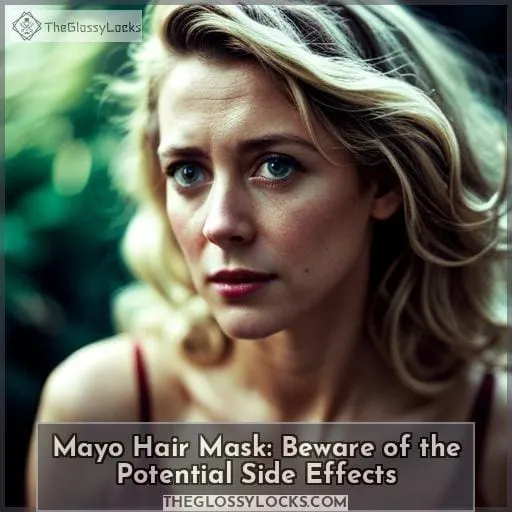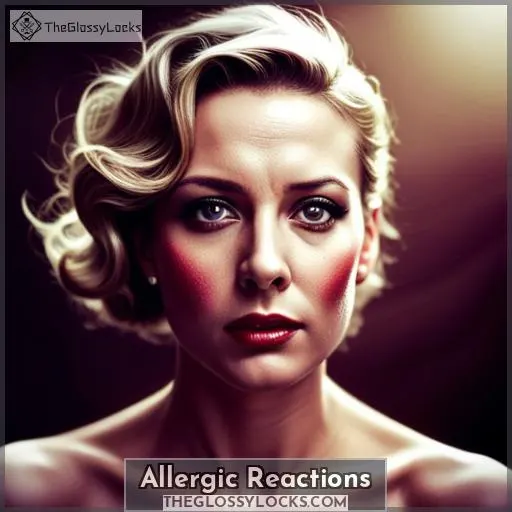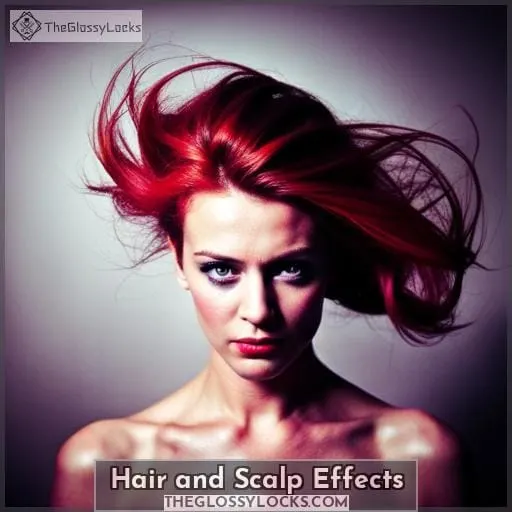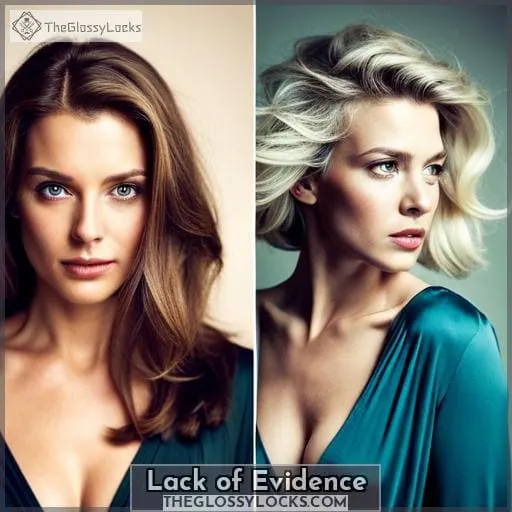This site is supported by our readers. We may earn a commission, at no cost to you, if you purchase through links.

While proponents of mayo hair masks swear by their effectiveness, you should be aware of the potential side effects before slathering it on your scalp.
From allergic reactions to scalp irritation, this article explores the potential drawbacks of using mayo as a hair treatment, so you can make an informed decision about whether or not it’s right for you.
Table Of Contents
- Key Takeaways
- Allergic Reactions
- Hair and Scalp Effects
- Interactions With Other Products
- Lack of Evidence
- Frequently Asked Questions (FAQs)
- What are the long-term effects of using a mayonnaise hair mask, particularly on hair health and scalp sensitivity?
- Are there any specific ingredients in mayonnaise that can cause allergic reactions or scalp irritation, and what are the symptoms to watch out for?
- How can I minimize the risk of product interactions when using a mayonnaise hair mask, especially if I am using other hair care products or treatments?
- What are some potential drawbacks or limitations to using a mayonnaise hair mask, such as issues with residue buildup or the smell of the mask?
- Are there alternative natural hair masks or treatments that provide similar benefits to mayonnaise, but with less potential for side effects or interactions?
- Conclusion
Key Takeaways
- Mayonnaise hair masks can trigger allergic reactions, skin irritation, and scalp problems in some individuals.
- Mayo’s thick texture can weigh hair down, causing greasiness and scalp irritation, especially for those with sensitive skin.
- Mayo hair masks can interact with oil-based products, leading to excessive greasiness, scalp irritation, and dandruff.
- Claims about mayonnaise’s hair benefits lack substantial scientific backing; consider alternative options like coconut oil, olive oil, or vinegar rinses.
Allergic Reactions
If you have an egg allergy, using a mayonnaise hair mask could trigger an allergic reaction.
Even if you don’t have an egg allergy, mayonnaise can still cause skin irritation, especially if you have sensitive skin.
If you experience any itching, redness, or swelling after using a mayonnaise hair mask, rinse it out immediately and wash your hair with a gentle shampoo, especially if you have an itchy scalp and dandruff concerns mayonnaise hair mask benefits
.
Egg Allergy
If you have an egg allergy, using a mayonnaise hair mask could trigger an allergic reaction.
This reaction may manifest as:
- Skin irritation
- Scalp irritation
- A more severe allergic response
Before using a mayo hair mask, perform a patch test on a small area of your skin to check for any adverse reactions.
If you experience any discomfort, discontinue use and consider alternative hair care options that are free of egg-based ingredients.
Skin Irritation
Even with healthy skin, you’re at risk for irritation from a mayonnaise hair mask.
Its thick, oily texture can clog pores and trigger acne breakouts.
Your scalp isn’t immune either. The mask may irritate it, especially if you have sensitive skin.
Seek medical advice if you experience discomfort.
Hair and Scalp Effects
Mayonnaise hair masks can weigh down hair, making it appear greasy.
Additionally, the ingredients in mayonnaise can irritate your scalp, potentially causing redness, itching, and flaking.
If you have sensitive skin, you may want to avoid using a mayonnaise hair mask altogether.
Greasiness
You may end up with greasy hair and scalp after using a mayonnaise hair mask.
This is especially true if you have fine or oily hair.
Overuse of mayo hair masks can weigh your hair down, making it look limp and lifeless.
Clarifying shampoos may be needed to remove the excess oil.
If you’re concerned about greasiness, consider using a mayo hair mask less frequently or look for mayo alternatives for hair care.
Irritated Scalp
Applying mayonnaise to your scalp can irritate it, leading to discomfort and potential harm.
The oil and vinegar in mayo can strip your scalp of its natural oils, causing dryness, flakiness, and irritation.
The mayonnaise residue can clog your hair follicles, leading to acne and inflammation.
Plus, the strong odor of mayo can linger in your hair, causing embarrassment.
If you have a sensitive scalp, using a mayo hair mask isn’t recommended.
Interactions With Other Products
A mayonnaise hair mask can also interact with other oil-based products you use, potentially leading to an excessively greasy scalp. This greasiness can weigh your hair down, making it appear limp and lifeless. If you’re prone to an oily scalp, it’s best to avoid using a mayonnaise hair mask or use it sparingly.
Overusing a mayonnaise hair mask can also lead to product buildup, which can irritate your scalp and cause dandruff. If you do decide to use a mayonnaise hair mask, be sure to rinse it out thoroughly to prevent any residue from building up.
You should also be aware that mayonnaise can interact with certain hair care products, such as clarifying shampoos and deep conditioners. Using a clarifying shampoo after a mayonnaise hair mask can strip your hair of its natural oils, leaving it dry and brittle.
If you’re looking for a natural way to improve the health of your hair, there are many other options available that are less likely to cause side effects. These include using coconut oil, olive oil, or avocado oil as a hair mask. You can also try using a vinegar rinse or a baking soda rinse to remove product buildup and clarify your scalp.
Lack of Evidence
Often, claims about mayonnaise’s efficacy as a beneficial ingredient for improving various aspects of hair health lack substantial scientific backing.
While many proponents laud the effectiveness claimed by mayo enthusiasts regarding its ability to moisturize and nourish dry or damaged strands, there exists a dearth in empirical data supporting such assertions.
Experts within both medical fields alongside those specializing more specifically upon matters pertaining towards cosmetology advise individuals seeking potential solutions which can be found via natural remedies should consider exploring alternative options boasting proven histories success instead when designing their personal routines surrounding maintenance & growth promotion alike!
Frequently Asked Questions (FAQs)
What are the long-term effects of using a mayonnaise hair mask, particularly on hair health and scalp sensitivity?
Long-term effects of mayonnaise hair masks on hair health and scalp sensitivity are unclear due to limited scientific evidence.
Consult a dermatologist for personalized advice based on your hair type and scalp condition.
Are there any specific ingredients in mayonnaise that can cause allergic reactions or scalp irritation, and what are the symptoms to watch out for?
Watch out for allergic reactions to egg yolks, a common mayonnaise ingredient.
Symptoms may include scalp irritation, redness, and itching.
If you have sensitive skin, do a patch test before applying a mayonnaise hair mask.
How can I minimize the risk of product interactions when using a mayonnaise hair mask, especially if I am using other hair care products or treatments?
Like a cautious explorer venturing into uncharted territory, minimize product clashes by examining labels for shared ingredients.
Steer clear of oil-based companions.
This harmonious approach ensures your hair’s well-being.
What are some potential drawbacks or limitations to using a mayonnaise hair mask, such as issues with residue buildup or the smell of the mask?
Mayonnaise hair masks can sometimes leave behind a noticeable odor or residue, especially if not thoroughly rinsed.
Consider using clarifying shampoos to remove buildup.
Opt for homemade masks to control ingredients and minimize unwanted smells.
Are there alternative natural hair masks or treatments that provide similar benefits to mayonnaise, but with less potential for side effects or interactions?
Seeking a more natural path to healthy hair?
Explore avocado, yogurt, and coconut oil masks for:
- Deep conditioning
- Frizz reduction
- Scalp nourishment
Conclusion
Mayo hair masks may seem harmless, but they can lead to allergic reactions, scalp irritation, or greasy hair.
If you have an egg allergy, avoid them altogether.
Mayo can also interact with other hair products, so use caution.
There’s also no scientific evidence to support their effectiveness.
Until more research is done, consider alternative hair treatments.







